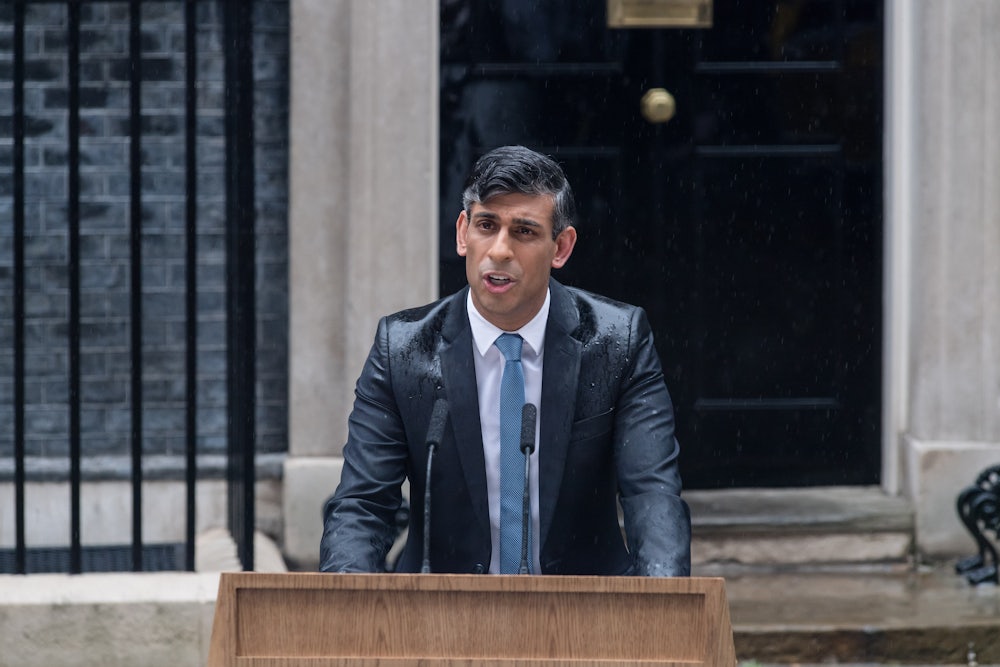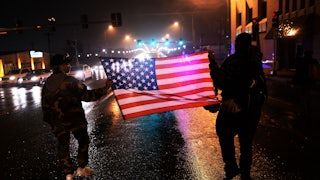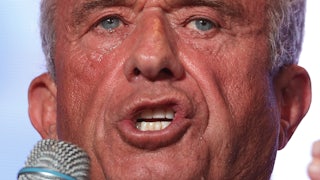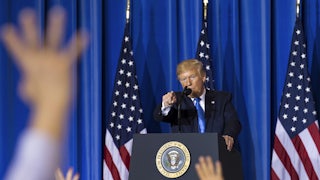There is mold in the walls and shit in the rivers, posh butter in the supermarkets has anti-theft tags stuck to it, the trains run on schedule about half the time, the average pub-poured pint of lager—the blood of the nation—is nearing the criminal price of 5 pounds ($6.34), and on May 22 a new general election was announced to the people of Great Britain by a prime minister who is richer than the king.
“Don’t waste time worrying about rain,” the poet Philip Larkin once wrote to his mother. “This is a wettish country. Lots of it falls.” As Rishi Sunak, that prime minister, started speaking outside 10 Downing Street, the pour began. By the time he finished (having used the phrase “bold action” six times), he was sodden. Sunak later admitted he got himself drenched in an attempt to appeal to those most prized qualities in the British soul: stubbornness, unflappability, pluck. Instead, this ex–Goldman Sachs banker, married into a grotesquely wealthy Indian tech dynasty, embodied the fate of his party: drowned. Just out of shot, a protester had set up an amplifier, and as Sunak evoked “the most challenging times since the Second World War,” he did so against the happy strains of the D:Ream hit “Things Can Only Get Better.”
Sunak’s Conservative Party has ruled Britain for 14 years. What has their regime wrought? Three elections, two bouts of serious economic crisis, one major constitutional emergency (in a country with no constitution), and five prime ministers, including the 49-day premiership of Liz Truss who infamously failed to outlast a festering lettuce in a wig. As Sunak’s shoulder pads gleamed in the dusk, the country is barely withstanding the damage he and his four predecessors inflicted over those 14 years: hunched and straining, poorer, meaner, grubbier, more desperate, more distressed. The prevailing moods, in common with rain, are anxiety, impatience, and grief.
The polls are unanimous. The Tories are losing and losing badly. The only shade of difference is whether the wipeout will be partial or total. One survey has them reduced to around a hundred seats in Parliament; another sees them with as few as 30 members of parliament; just five years ago, by contrast, they won 365 seats. Sir John Curtice, doyen of psephologists, has given Keir Starmer’s opposition Labour Party a 99 percent chance of forming the next government. Sniffing doom on the wind, many Tory M.P.s are either resigning or refusing to stand again; at time of publication, 79 Tories think it better to flee the flood than sink in it—including party stalwart Michael Gove and the Covid-era Health Secretary Sajid Javid. Burblings from the ranks fear the total end of the Conservatives as an entity, facing an “extinction-level event.”
Should the polls prove correct—short of a 2016-scale error—the annihilation will be justified. Wage growth is at its lowest level since the Napoleonic Wars. What the Financial Times calls the “rental market” and what the rest of us call “How much of your money someone richer than you takes every month” is stratospherically inflated; rent is about half a person’s average salary in London. Chain stores on British high streets close permanently at a rate of 14 per day, leaving most shopping areas a procession of corrugated shutters, uncollected rubbish, and the sleeping bags of the homeless. The precious marvel that is the National Health Service is cracking at the seams; at the current rate, waiting lists will not be cleared for another 685 years. The union for junior doctors, the British Medical Association, has organised 10 strikes and walkouts in the past year for a pay deal that would only bring wages up to the current level of inflation. The city of Birmingham was the first to tip over into bankruptcy; more will follow. In 2022, at least 3 percent of all families in Britain—around two million people—could not afford to eat. Like a revenant from Dickens, Victorian diseases like scurvy, rickets, and scabies are back to blight children. Life expectancy has dropped to the lowest level since 2010—tellingly, the year the Conservatives took power, at the height of the recession.
These are the bitter fruits of austerity: an experiment in sado-monetarist economics and financial barbarism. Not much unites those five prime ministers other than the constant ritual tribute in blood to their coiffed icon, Margaret Thatcher. Yet Thatcher, back in the 1980s, did not lie about how brutal the first shock of neoliberalism was going to be. She coldly promised torture before riches. Its sequel, however, was pitched by its architect George Osborne, chancellor under David Cameron, as a bit of belt-tightening resembling that most prized memory in the national canon: the Blitz Spirit. Come on, chaps, buck up and give it some welly. The shattering of society into thinner fragments was supposed to be a hardy adventure.
Midway through this downhill plummet, Britain bumbled backward out of the European Union. The wreckage of this four-year disaster can now best be seen as an attempt to escape the harsh bite of austerity. Brexit was a retreat from hunger into myth: an embrace of antique fables about British pluck and derring-do, a belief that even without an empire and an industrial base this archipelago might reclaim past glory. Faced with profound turmoil, much of the nation turned to a half-remembered falsehood about their grandfather’s generation, marching along with Churchill. This election is the reckoning Brexit postponed.
Two days after Rishi Sunak revealed the election date, the former leader of the Labour Party Jeremy Corbyn announced he would contest his parliamentary seat in Islington, north London, as an independent. He held that seat as a Labour man for 40 years. He was immediately sacked by the party, finally putting a bow on a four-year exorcism of all traces of Corbyn and Corbynism from the Labour machine.
Keir Starmer, the current leader, used to be one of his lieutenants, thought to be on the softer wing of the party’s left. “We have to fight,” Starmer said during the 2020 leadership contest, pitching himself as Corbyn’s inheritor, “to put wealth, power, and opportunity in the hands of all.” He would advance a “moral case for socialism.” Having promised this, Starmer then embarked on a scouring campaign of suppression against those principles and against anyone who might hold them. Corbyn was held personally responsible for the 2019 election defeat (even though, as the historian David Edgerton has noted, the party’s share of the vote was higher than in 2005, during the Blair years), while many of his close allies were fired on the thinnest pretence. On May 24, Starmer declared victory over that vanquished tendency: “I think Jeremy Corbyn’s days of influencing Labour party policy are well and truly over.”
The party today is a clean and characterless beast, open for business. Corporate lobbyists, rightly treated with scorn under the previous leadership, have already suckered on their tentacles. A “smoked-salmon offensive” has party operatives going palms-open to the financiers of the City of London. Thus the hurried evacuation from the party’s platform of anything that might resemble policy. “Starmerism” at best might be described as a Giro d’Italia of backpedalling: Vanished are the promises to impose rent controls, limit bankers’ bonuses, reform the House of Lords, or give the Commons a deciding vote on war. One of the Tories’ most nakedly cruel schemes was to cap welfare payments to out-of-work families at two children; three kids means no extra cash. Labour will not throw that out, either. A transformative climate change scheme once pledged investment of 28 billion pounds per year; that figure is now 4 billion pounds per year and receding quicker than Prince William’s hairline.
Ideological content is also difficult to spot in this muck of moderation. Restraint, consensus, penny-pinching: These seem to be the themes, along with vague appeals to “family,” the “dignity of work,” and plenty of Union Jacks on the campaign leaflets. Rachel Reeves, a former Bank of England wonk and likely the next chancellor, has adopted “Stability is change” as both a slogan and an ethos—cynical in its acknowledgment that the masses want change but are being told to live with what they’ve got. When your catchphrase takes the form of a clarification, and when two of its three words mean the opposite of each other, do not expect enthusiasm. But Labour’s new method is to avoid excitement of any kind; when an electorate gets excited, it starts demanding things. Ambition, yearning, vision, the cultivation of anger to political ends—these were qualities tainted in the minds of the party right by its association with Corbyn, and nothing put ice in their arteries faster than “Jezza” reciting Percy Shelley’s “The Masque of Anarchy” from a Glastonbury stage—and getting an ovation. This new Labour Party has no enemies.
Sir Keir—he was knighted in 2014—prefers to think of himself as an administrator, better attuned to the “how” rather than the “why,” moved by manner rather than means. Starmer used to be the chief of the Crown Prosecution Service—a national version of a district attorney’s office—and there learned how to run a government department, preferring changes of culture rather than harsh restructuring. But blunting the state’s sharpest edges does not fill in the giant pit where the money ought to be. Starmer’s credentials here are not even technocratic, merely bureaucratic. This pose is the most worrying of all, for it says that political power should not be used to transform people’s lives. Starmer and his future Cabinet do not believe that profound social alteration is either good or possible. As prime minister, Starmer will be a maintenance man in overalls, doing the rounds to check the lights are still on, not noticing all the copper’s gone from the wiring.
This too, like Brexit, is a retreat from reality. For what have the Tories done over the last 14 years but demonstrate the crude ability of the state to make things substantially worse? Much as they were garbed in the colors of common sense, much as they relied on the harsh truths imposed on us by the economists, every decision taken by Tory governments was a political decision—it did not need to happen that way. Austerity was never the hard logic of dutiful caretakers; it was a political calculation to rescue rich friends and dump the burdensome price on those least able to endure the cost. Already taking for granted the votes of workers, the poor, and the underclass on whose behalf they are supposed to fight, Labour contests this election with a silent promise that—unlike its other promises—will remain unbroken: Keep coughing up. After all, things can only get better.




